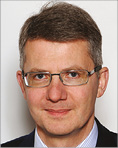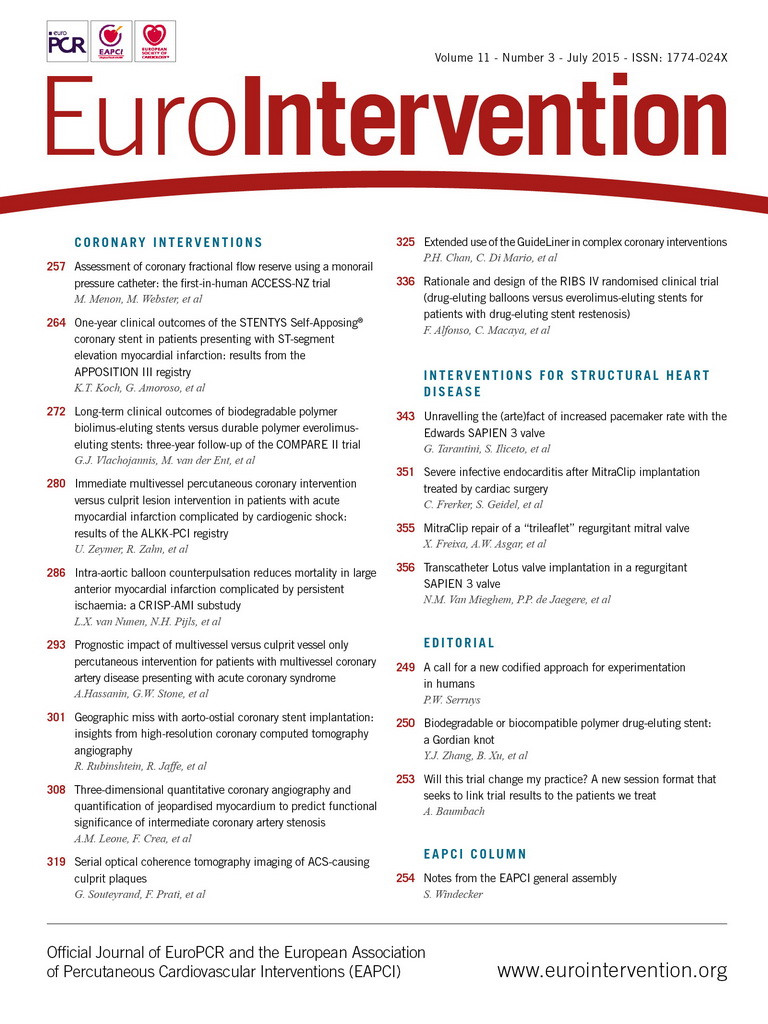
The annual general assembly of the EAPCI took place during the recent edition of EuroPCR in Paris. The success of EuroPCR, which is our official meeting, speaks for itself. It has now grown to over 12,000 participants with more than 500 sessions and 17 live centres from throughout the world offering 60 hours of live cases. Fifty-one national societies and working groups, members of the EAPCI, participated directly in the immense success of this Course, and this alone is fitting testimony to the vitality of our association.
Increasing Membership
During the EAPCI general assembly, Andreas Baumbach, secretary of the association, reported on the steady increase in membership which is now approaching the 6,500 level. This year, Germany and Italy led in terms of numbers of EAPCI members, but other countries across the Mediterranean basin (such as Egypt) were also very well represented. We are also seeing increasing membership from farther afield, for instance from China. This is, very importantly, a two-way street, and the EAPCI also participates in meetings and groups outside Europe. Reporting on our flourishing relations with international societies, Martine Gilard spoke about EAPCI activities in China for the CBS and CIT meetings; in India for CSI and IndiaLIVE; in Poland for the WCCI, Mexico for SOLACI and Indonesia for AICT.
Databases, Registries and E-learning
In terms of learning and education, as well as the creation of important statistics, surveys and building databases, the EAPCI has several ongoing efforts. The Databases and Registries committee chaired by Franz Weidinger reported on EORP registries with EAPCI involvement: these included the Transcatheter Valve Therapy long term (TCVT) – Sentinel, chaired by Martine Gilard; Chronic Ischemic Cardiovascular Disease (CICD) – General, chaired by M. Komajda with F. Weidinger as co-chair; Acute Coronary Syndromes – General, chaired by P. Ludman (EAPCI) and U. Zeymer (ACCA).
While on this subject, I want to underline the fine work of the “National Cardiac Societies & International Affairs” committee of the EAPCI led by Darius Dudek and co-chaired by Emanuele Barbato. This committee was instrumental in the work of the Third EAPCI Summit last spring and essential in re-invigorating the idea of EAPCI European-wide surveys. Their call to all National Societies and working groups to continue – or begin – working with our association to provide information from local registries and databases is critical to “monitoring the heterogeneity in practices”, “disclose obstacles to guideline implementation”, and “record the dynamics of harmonisation in interventional cardiology practices” throughout Europe. This work is highlighted in the excellent article in the May edition of EuroIntervention entitled “Mapping interventional cardiology in Europe: proceedings of the 3rd Summit of the European Association of Percutaneous Cardiovascular Interventions”1.
Concerning education, we learned during the general assembly that the ESCeL online learning platform of the ESC, to which the EAPCI actively contributed, is starting to attract increasing attention. With 51 countries represented, 252 trainees and three individuals who have now completed their training and received their certificates, we are well on our way to the utilisation of this platform designed to offer “the highest European standard of training and education, to as many as possible, at the lowest cost possible”.
Essential sessions organised by the Young
Once again, the activity of our special committees was highlighted. Of particular interest, in relation to this last EuroPCR, was the work of the “New Initiatives for Young Interventionalists”, the “Young” committee. It has consistently shown itself to be in the forefront of offering younger specialists access to information targeted to their needs. As reported by Davide Capadanno, the creation of “The Essentials” sessions was an especially popular offering resulting from the collaboration of the Young committee. These sessions focused on eight major themes of interest to the young – and not so young – specialist. They included such topics as restenosis, OCT, calcified lesions, bioresorbable scaffolds, left main bifurcations, STEMI and MVD, cardiogenic shock or complications management. This committee was also involved in the “PCR’s got talent” abstract competition. After EuroPCR they were instrumental in the organisation of the EAPCI Fellows Course, which took place last month at the European Heart House. The Young committee is also working closely with other “young” groups within the ESC to create a special session during ESC 2015.
Women
The Women’s committee was also deeply involved in sessions at EuroPCR and at other meetings. They are currently working on a publication concerning the survey as to why women do not choose a career path in interventional cardiology as well as preparing an ongoing project on “Radiation protection measurements and regularities”.
Choosing our association’s leadership
To ensure the future of the EAPCI, we look constantly towards the future and the renewal of our leadership. Jean Fajadet, Past President of the association and chair of the nominating committee, has been charged with opening the call for nominations for the positions of President-elect, Secretary and Treasurer. The process is now underway and should be completed by the end of the summer. We urge all who are interested to consult the EAPCI website for further information as we progress towards the 2016 elections.
It should also be noted that the EAPCI website has had an overhaul to make it more accessible, with information easier to obtain. This new version was launched along with a general overall re-looking of the ESC website itself. The goal was to respond to the increasing use of websites by mobile devices, and this has been achieved with the new design. The EAPCI website remains a sure source of information – along with EuroIntervention – about what is going on in the EAPCI and its different meetings and committees.
Reference

